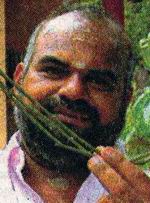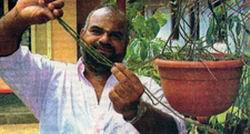
|
| Sreekumar, ‘Kailasam’, Elamkunnappuzha, Kochi |
|
|
|
Download Database of featured talents. (Excel file) |
He had spent half his life collecting medicinal plants from as far as Nepal and as difficult as dense forests so that the traditional herbal treatment need not suffer for want of medicines. For Sreekumar, ‘Kailasam’, Elamkunnappuzha, Kochi, the 1200 medicinal plant collection in front of his house, it is reason enough to feel satisfied.
Sreekumar, whose ancestors were traditional healers, has inherited another heritage from the past. According to this he has the ‘right’ to supply ‘somalatha’ for the Soma Yaga to be held south of the Chalakkudy river.
It is the research-oriented attitude towards medicinal plants that separates his household garden from other medicinal plant collections. For example he wanted to know how many varieties of jasmine are there. And once he knew there were 6 varieties, he collected all of them.
The camphor tree, trees that give frankincense and asafetida etc are available here. ‘Karinjappatta’, ‘Neer Maruthu’, ‘Nagadanthi’ etc that are rare even inside the forests are available in the front yard of his house. He collected ‘Rudraksham’, called ‘Gauri Sankaram’ locally, from Nepal. The camphor tree was brought from Himalayas. In addition to this, the rare tree from Sabarimala forests, ‘Bhadraksham’ as well as ‘Anali Vegam’ that can cure viper venom are other rare species in his collection.
It was when he could not practice medicine despite being in possession of excellent manuscripts that he thought of raising a garden of medicinal plants.
Over the centuries it is known that certain plants are cure for certain diseases. Today one is not able to try them, as the plants are not available. It is to prevent this situation that I have spent all these years collecting plants. Today I feel satisfied, says Sreekumar, who treats patients without any desire for reward.

Sreekumar with the Somalatha creeper
Courtesy: Vadayar Sunil, Kerala Kaumudi, July 20, 2003
Contributed by: Administrator
